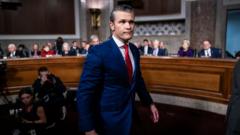Pete Hegseth, nominated by former President Donald Trump for the position of Secretary of Defense, was confirmed by the U.S. Senate following a tumultuous confirmation process that spotlighted significant political fractures. The late-night vote resulted in a tie of 50-50, leading Vice President JD Vance to exercise his role as a tie-breaker in favor of Hegseth. Notably, three Republican senators, including the influential former Senate Majority Leader Mitch McConnell, cast their votes against him.
During Hegseth's confirmation hearing, he faced intense scrutiny over various misconduct allegations, including a serious accusation of sexual assault from 2017, which he has has staunchly denied. Additional queries arose about his previous infractions, including excessive alcohol consumption and infidelity during his past marriages. Hegseth, a veteran who previously worked as a television host at Fox News, will now oversee a vast department comprising approximately three million employees and managing an $849 billion budget.
The reluctance of four Republican senators to support Hegseth alongside 47 Democratic and independent senators could have led to a defeat for his nomination. McConnell's unexpected dissent resulted in Vance casting the crucial tie-breaking vote, signifying a rare moment in recent political history, as he became only the second vice president to do so following Mike Pence's similar action in 2017 for Betsy DeVos's education secretary confirmation.
During the confirmation hearing, Hegseth was questioned primarily by Democratic senators about his qualifications, prompting defense from several Republicans who believe he aligns closely with Trump's agenda. Mississippi's Roger Wicker, chair of the Senate Armed Services Committee, remarked that Hegseth represents a necessary change in the Department of Defense.
However, concerns voiced by certain Republican senators, including Lisa Murkowski and Susan Collins, centered on Hegseth's alleged past behaviors. Collins expressed doubts about his requisite experience for the significant role, while Murkowski emphasized that such behavioral history reflects poor judgment unworthy of leading armed forces.
Hegseth acknowledged his past missteps during his testimony but reiterated his commitment to military readiness and standards in his forthcoming role, noting, "Warfighting, lethality, meritocracy, standards, and readiness. That's it. That is my job."
Underlining the divide in the Senate, the confirmation of Hegseth brings forth a critical discourse on what qualifications and personal conduct should be expected of those who assume high-ranking governmental positions, particularly in areas as sensitive as national defense. As the new Secretary of Defense, Hegseth's leadership will be closely monitored, particularly given the controversies surrounding his candidacy.





















